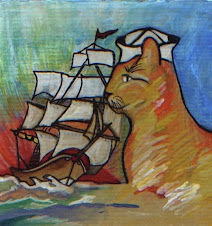Making our own means
1) WAY cheaper! A 16 oz bottle can cost $4! The ingredients we use are very cheap in comparison=5 tea bags & a cup of sugar (plus the 'bucha mama and some water).
2) Transport of liquid is one of the most costly food transportations out there because of the inherent weight of liquid. Any time you can make your own liquid drink, you help reduce the amount of gas used to transport this expensive stuff.
Other ideas: mix a batch of juice from frozen concentrate, make your own tea or coffee instead of buying pre-packaged bottles, put your own tap water (or sign up for delivery of local spring water like we do, from Highbridge Springs) in a reusable bottle and bring with you everywhere (like you bring your wallet & keys & phone with you everywhere) instead of buying bottled water.
Here's our kombucha, sitting up high where it won't be bothered for a week while it stews. Kombucha is a 'mushroom'-like colony; that's it floating on the top. To make the drink, you start with a kombucha 'mother', and when it's finished brewing, you'll end up with a new 'baby' 'bucha, to give to a friend to start making their own! (Any takers?) The neat thing is you can keep the starter (previous 'bucha baby, now 'bucha mama) in the fridge virtually indefinitely until you're ready to use it because cold just makes the mushroom go dormant (doesn't kill it).



